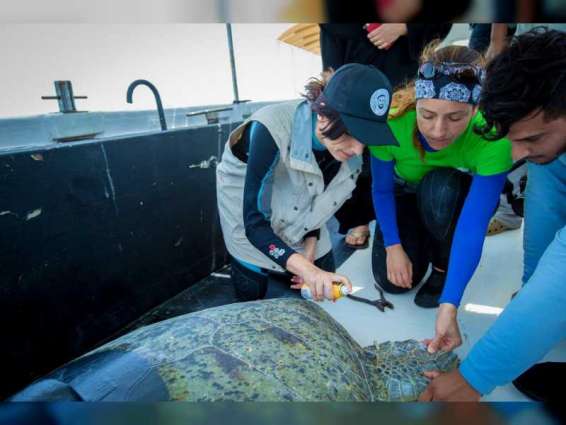ABU DHABI, (Pakistan Point News - 20th Jul, 2020) The COVID-19 pandemic and its associated lockdowns have severely disrupted critical species conservation activities and fieldwork worldwide according to a survey of more than 300 conservationists in 85 countries.
The survey, conducted by the Mohamed bin Zayed Species Conservation Fund or MBZ Fund, found the pandemic had affected the ability of 83 percent of conservationists to conduct critical fieldwork, while 70 percent said planned conservation activities had been canceled or postponed. Based in Abu Dhabi, the MBZ Fund is a philanthropic endowment providing small grants of up to US$25,000 to individual species conservation initiatives. Since 2009, the Fund has provided over $20 million to more than 2,100 projects, supporting more than 1,300 different species and subspecies.
"With an estimated 10,000 species being lost to extinction per year, a rate that is 1,000 times faster than at any other time in history, conservation work in the field is the critical first line of defence against extinction, habitat destruction, deforestation, over-hunting, poaching, and pollution," said Razan Al Mubarak, Founding Managing Director of The MBZ Fund. "By confirming that efforts to prevent biodiversity loss have been significantly harmed during the pandemic, the survey makes clear that the conservation community must come together to urge for a ‘nature recovery plan’ where conservation initiatives are given the necessary financial stimulus to not just recover but thrive in the long term."
Since much conservation work is time-sensitive due to factors such as migration and mating seasons, survey respondents reported that range of critical projects had been delayed until at least the spring of 2021 -- from the releases of Madagascar big-headed turtles (Endangered) and Polynesian tree snails (Critically Endangered) to field research on migratory birds like vultures in Uttarakhand, India and the Sulu Bleeding-heart (Critically Endangered) in the Philippines.
The survey also found that conservationists are very concerned about their own financial futures and those of their organisations. Forty percent said the pandemic negatively affected their job or career, with 22 percent reporting their organisations planned to eliminate jobs. Sixty-eight percent of respondents said their organisation had been negatively impacted, with 57 percent reporting their organisation is experiencing financial difficulties. Many conservationists highlighted the loss of revenue for their organisations due to park, zoo, and aquarium closures, the decline in eco-tourism, and the reduction in student enrollment for courses and fieldwork experiences.
For example, Phil Murray, who helps the Grootbos Foundation protect endangered endemic plants in Gansbaai, South Africa, said its key partner, Grootbos Private Nature Reserve had no tourism during its peak season and anticipates vastly reduced tourism income for the foreseeable future.
"Tourists pay a conservation levy and this income stream is now no longer viable," said Murray. "The value of tourism as a motive to preserve endangered habitat has also now declined as, without the eco-tourism revenue, many landowners may be tempted to plough remnants of endemic plants for agriculture."
Tjalle Boorsma, who operates a reserve for the Blue-throated Macaw (Critically Endangered) in the savannas of northern Bolivia, said his programme will also be significantly impacted by the loss in revenue from ecotourism.
"This income is vital for the sustainability of the programme and we are not sure if we will cover this loss through other funding sources since small grants tend not to come through during times of crisis," said Tjalle Boorsma. "We are concerned this is just the beginning of a long-term economic crisis that will affect conservation badly."
The survey also found that 30 percent of conservationists were concerned that the pandemic would increase threats to the species and habitats, including increased poaching due to reduced presence of law enforcement and tourists and greater reliance on hunting by local communities due to the economic impact on livelihoods. Many respondents were especially concerned about the inability to monitor and prevent threats from invasive species, such as rats and cats, from eating eggs or hatchlings.
Luis Ortiz-Catedral, who is working to protect Pink Iguana lizard (Critically Endangered) in the Galapagos, Ecuador, said, "The travel and physical distancing restrictions in place mean that critical predator control work cannot be completed as per Calendar activities planned months ago. It may resume in the coming months, but it is unlikely to have the same effect after a multi-month gap."
In addition to spurring the conservation community to lobby for financial rescues, Al Mubarak said the survey results should also inspire the conservation sector to innovate in terms of diversifying funding sources and exploring ways to engage local communities in supporting conservation efforts.
"Governments can provide more support to conservationists who are engaging with local communities in order to reduce economically and socially harmful destruction of nature and biodiversity," said Al Mubarak. "This would not necessarily be simply financial, but a societal undertaking that would provide long term benefits for both humans and threatened species."




